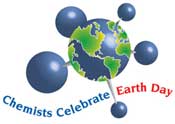Climate: Print Resources
This is a collection of Print Resources about the climate. A separate collection of Electronic Resources is also available.
Most titles below are outstanding and recommended by the National Science Teachers Association that fit this year’s theme for Chemists Celebrate Earth Day. Descriptions are based on reviews from the NSTA or publishers web site.
Key: E = Elementary (K–5), I = Intermediate (6–8), HS = High School (9–12), C = College, G = General Public
What is Climate?
- National Geographic Student Atlas of the World. Washington, D.C.: National Geographic Society, 2001. 128pp. ISBN 0-7922-7235-8. (HS)
- This rich resource serves as a comprehensive integrated studies tool.
Students conducting science, technology, and society investigations
may tap into the wealth of information in this atlas. Included are
maps featuring various topics: geologic history, physical
characteristics, climate, vegetation, population, culture, economy,
food distribution, and natural resources. Includes a glossary, index,
and list of web sites.
Source: NSTA Outstanding Science Trade Books for Students K-12 for 2002
Climates of the World
- Global Warming: Understanding the Debate. Kenneth Green. Berkeley Heights, NJ: Enslow Publishers, 2002. 128pp. ISBN 0766016919. (I, HS)
- This book leads young readers through the very relevant, complex, and
conceptually rich topic of global warming. This evenhanded treatment
of the debate would be accessible to a mature sixth grade reader, but
would best serve older students with a stronger science background.
The writing is well illustrated, and complex concepts are supported
with metaphors. The author raises questions that promote scientific
thinking and an understanding of the scientific method. He discusses
the measurement challenges and limitations of each data set taken.
One shortcoming is the omission that ice core research provides
additional evidence for rapid climate change in the Earth’s history.
Sudden and radical changes in the past may have implications for the
present.
Source: NSTA recommends
Copyright © 2005 American Chemical Society

